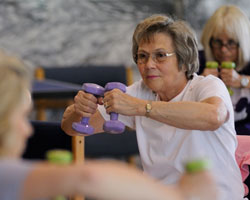Stay Strong, Stay Healthy: K-State rolls out new program for Kansans
The eight-week program for older adults is designed to boost health and quality of life.
 Photo and caption available
Photo and caption available
Released: April 18, 2016
MANHATTAN, Kan. – Eat healthy – check. Get aerobic exercise – check. Do strength training – not so much.
The loss of muscle mass can slip up on us without warning. At some point, we realize we can’t do the things we used to but also don’t know how to counter the process. Kansas State University has launched Stay Strong, Stay Healthy to help older adults regain strength while improving their balance, flexibility and overall health.
“Adults start to lose muscle mass, even as early as our 30s. And in our 50s, it starts to accelerate,” said K-State Research and Extension family and consumer science specialist Sharolyn Jackson. However, older adults are sometimes reluctant to start strengthening activities to counter the effects of aging on their bodies. The idea of going to a gym or not knowing the proper exercises to do at home can keep people from starting.
“We’re excited to bring Stay Strong, Stay Healthy to Kansas,” said K-State family and consumer science specialist Gayle Price, who coordinates the program with Jackson. It originated at Tufts University and was initially designed for women. The University of Missouri adapted it for men and women. K-State is using the Missouri adapted program.
The program is offered at a minimal cost in many county and district K-State Research and Extension offices and starts at different times of the year, depending on location. To learn more about the program and find out if your local extension office is offering the class, check the website Stay Strong, Stay Healthy. You can also contact Price at 620-820-6123 or gprice@ksu.edu, or Jackson at 785-532-2273 or sharolyn@ksu.edu.
Participants in Stay Strong, Stay Healthy meet for one-hour sessions, twice a week for eight weeks. Activities include warm-up exercises, strengthening exercises with and without weights, and cool-down stretches. Class members are encouraged to do the exercises on their own once more per week. Most training locations will provide weights for use during the program.
Post-menopausal women can lose 1 to 2 percent of their bone mass annually, said Price, who noted that research has shown that strength training restores bone density and reduces the risk of fractures among women aged 50 to 70.
Other potential benefits of strength training include a decrease in arthritis pain, weight maintenance, and a reduction in the risk of diabetes, heart disease and depression. Stress management and improvement in sleep quality and overall physical vitality are other potential benefits.
Price, along with Jackson and extension agents, have been through the training course and are certified to teach the class.
“I’m a pretty active person. I try to walk every day. I thought I was in pretty good shape, but these exercises made a difference in me,” said Price, who added that she’s continued to do the exercises since going through the training and has improved her upper body strength, particularly.
Sidebar or box:
Benefits of strength training for older adults
Research has shown the health benefits of strength training, including:
- Muscle mass and strength – Muscle mass and strength decrease during the aging process. Several studies have shown increased muscle mass and strength in older adults after performing resistance exercise.
- Restoration of balance and flexibility and a reduction in falls – A study in New Zealand showed a 40 percent reduction in falls with simple strength training in women 80 years and older.
- Arthritis relief – A Tufts University study showed that strength training decreased arthritis pain by 40 percent. The effectiveness of strength training to ease the pain of osteoarthritis was as potent as medications for many participants. Similar effects of strength training in patients with rheumatoid arthritis have also been demonstrated.
- Sleep improvement – Recent research showed improvements in sleep among older adults who participated in strength training.
- Cardiovascular health – Tufts University found that cardiac patients gained strength, flexibility and aerobic capacity when they did strength training three times a week as part of their rehabilitation program. This and other studies prompted the American Heart Association to recommend strength training as a way to reduce the risk of heart disease and as a therapy for patients in cardiac rehabilitation programs.
- Improved glucose control – Diabetes is common in American adults. A recent study of Hispanic/Latino men and women conducted by Tufts University showed that 16 weeks of strength training produced dramatic improvements in glucose control. Seventy percent reduced their medication.
– Source: K-State Research and Extension
-30-
K‑State Research and Extension is a short name for the Kansas State University Agricultural Experiment Station and Cooperative Extension Service, a program designed to generate and distribute useful knowledge for the well‑being of Kansans. Supported by county, state, federal and private funds, the program has county Extension offices, experiment fields, area Extension offices and regional research centers statewide. Its headquarters is on the K‑State campus in Manhattan.
Story by:
Mary Lou Peter
mlpeter@ksu.edu
For more information:
Gayle Price - 620-820-6123 or gprice@ksu.edu
Sharolyn Jackson - 785-532-2273 or sharolyn@ksu.edu
